
(ヨシモリ マサル)
YOSHIMORI, Masaru
“ Einsam aber Frei ”
Professor emeritus, Yokohama National University
主専攻
研究領域
≪ブログはこちら≫
上掲の絵画作品: 守屋多々志 『ウィーンに六段の調 (ブラームスと戸田伯爵極子夫人)』
古舘多寿子夫人と大垣市守屋多々志美術館の厚意により掲載
www.city.ogaki.lg.jp/0000002019.htmlPicture above by MORIYA Tadashi “The Melody of Rokudan Sounds in Vienna: Brahms and Countess Toda”, with kind permission by Ms Tazuko Furutachi and the Moriya Tadashi Art Museum, Ogaki City.
Tableau ci-dessus par Tadashi MORIYA, “La Mélodie de Rokudan Sonne à Vienne: Brahms et Comtesse Toda,”, avec autorisation aimable de Mme Tazuko Furutachi et du Musée d’Art Moriya Tadashi, Ville d’Ogaki.

慶應ビジネススクール姉川知史先生による撮影。
慶應義塾大学日吉キャンパスにて。2014年11月15日。
1938年福岡生まれ、秋田、鹿児島育ち。1985年3月フランス・モンペリエ第I大学(経済学博士, Docteur en Sciences économiques, nouveau régime)、1965年6月フランス・フォンテンブローINSEAD (経営学修士、MBA)取得(荏原製作所による派遣)。1992年−93年オクスフォード大学セントアントニ−ズ・カレッジ客員研究員(Senior Associate Member)、1998年ベルリン自由大学DAAD客員教授(Gastdozent)。1967年東京都立大学経済学部卒業(学士入学)、1961年東京外国語大学ドイツ語科卒業。
1975年INSEAD准教授(Associate Professor担当:日本の経営 Japanese Management)、パリ第9大学ド−フィヌ客員教授(担当:国際マーケティング Marketing international)、HEC講師(担当:日本の経営Gestion japonaise)、ESSEC講師(担当:国際マーケティング Marketing international)、パリ第3大学常任講師(担当:日本の経営 Gestion japonaise)、その他を歴任の後1985年帰国。「」「」
同年より1994年まで国際大学大学院国際経営研究科教授(担当:Japanese Management in Comparative Perspectives、Management of International Enterprises、Marketing)、同副研究科長、図書館長を経て1994年より2004年まで横浜国立大学経営学部・大学院教授(担当:国際比較経営)、2004年3月定年退官、4月名誉教授授与。同年4月より放送大学教授、(担当:テレビ科目:「企業統治と企業倫理」、「企業戦略と企業文化」、ラジオ科目:「グローバル経営戦略」、「経営者機能」)、2009年3月定年退任以後2014年まで客員教授として大学院学生指導と面接授業担当。
国際経営における実務経験14年:国際経営の実務(特に外国市場・日本市場進出戦略、ライセンス契約、合弁会社設立契約・交渉)および日本企業、欧米企業への全般コンサルティング)。
日本経営学会、企業家研究フォーラム、ドイツ経営学研究会、日仏経営学会、Verein der Hochshullehrer für die Betriebswirtschaft
● 日仏経営学会理事 2005年―2010年
● 医療科学研究所評議員 1990年−2001年、同理事 2001年―2011年
● サンスター株式会社 独立取締役 2004年−2008年
● 三菱ふそうトラック・バス株式会社 品質諮問員会委員 2004年−2005年
● 大蔵省金融財政研究所『日欧米の経済システムの比較と今後の展開について』研究委員会委員、委員長榊原英資1994年10月−1995年6月
● 日本学術振興会特別研究員等審査会専門委員 1993年4月−1995年3月
● 外務省経済局『米国の競争力強化問題』研究委員会委員長 1992年1月−3月
● 日本経済調査協議会『先進国における投資摩擦と日本の対応委員会』委員1990−1991年
● 11月29日 日本経営学会関東部会 風間信隆氏報告「ドイツ企業の統治と経営―VWグループの企業統治とモノづくり競争力」の司会コメンテーター、日本大学商学部
● 11月15日 ファミリービジネス学会第7回全国大会 招待講演「同族企業の統治構造の成功と失敗ードイツ・クルップ社とボッシュ社」、慶應義塾大学大学院ビジネススクール
● 10月25日 日本経営学会関東部会報告「ポルシェ社における同族統治」、一橋大学
● 7月20日 企業家研究フォーラム年次大会報告「所有権の社会的責任と公益財団−ドイツAlfred KruppとRobertBosch」、大阪企業家ミュージアム
● 6月21日 日本経営学会関西部会報告「ドイツ同族大企業の企業形態」兵庫県立大学
● 6月3日 亜細亜大学呉サリー教授招待講義「トヨタとフォルクスワーゲン」
● 2月3、15日 麗澤大学専攻塾「経営の本質」
金融庁、日本財務管理学会、日本経済団体連合会コーポレート・ガバナンス部会、JA全国農業共同組合中央会ガバナンス研究会、日本道路公団総合研修所、日本接着剤工業会、日本油空圧工業会、新潟県庁専門研修公共経営課程、さいたま市市民大学、公益事業学会、日本経営財務学会、日独公開シンポジウム、社会技術フォーラム、日仏会館、NHKラジオ深夜便、日本興亜損保、竹中工務店、エーザイ、国際連合ジュネーブ本部経済社会理事会欧州経済委員会(ECE)、一橋大学大学院シニアエグゼグティブプログラム、麗澤大学、千葉商科大学、日本大学、専修大学、 など
国際基督教大学 (英語)、国際大学(英語)、日本大学、中央大学、専修大学、東京国際大学、麗澤大学、福井県立大学、高崎経済大学





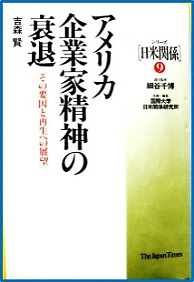


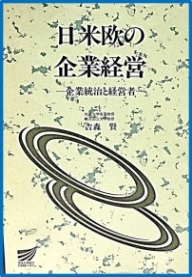

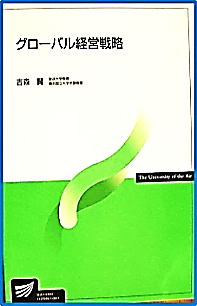

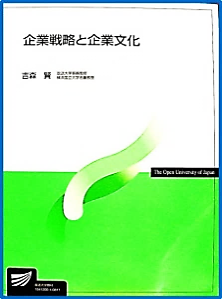
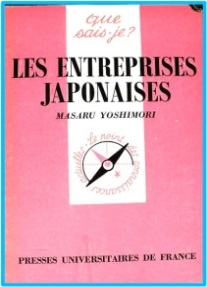
編著「世界の医薬品産業」東京大学出版会、2007;
共同執筆「コーポレート・ガバナンス」(斉藤正章);
「国際経営」(原田順子)いずれも放送大学教育振興会、2009;
菊池敏夫・平田光弘編著「企業統治の国際比較」文真堂、2000;
高橋俊夫編著「コーポレートガバナンス」中央経済社、1995
|
企業戦略と企業文化 |
放送大学教育振興会 |
2008年 |
|
企業統治と企業倫理 |
放送大学教育振興会 |
2007年 |
|
グローバル経営戦略 |
放送大学教育振興会 |
2006年 |
|
経営者機能 |
放送大学教育振興会 |
2005年 |
|
日米欧の企業経営−企業統治と経営者 |
放送大学教育振興会 |
2001年 |
|
日本の経営・欧米の経営−比較経営への招待 |
放送大学教育振興会 |
1996年 |
|
EC企業の研究−その発想と行動 |
日本経済新聞社 |
1993年 |
|
アメリカ企業家精神の衰退 |
ジャパンタイムズ社 |
1991年 |
|
企業家精神衰退の研究 |
東洋経済新報社 |
1989年 |
|
Les entreprises japonaises (Que sais-je? No. 2186) |
Presses Universitaires de France |
1984年 |
|
フランス企業の発想と行動 |
ダイヤモンド社 |
1984年 |
|
ヨーロッパの精神と経営 |
東洋経済新報社 |
1983年 |
|
西ドイツ企業の発想と行動 |
ダイヤモンド社 |
1982年 |
|
西欧企業の発想と行動 |
ダイヤモンド社 |
1979年 |
Graduate of INSEAD (MBA, 1965), Fontainebleau, France and Doctor of Economics (University of Montpellier I, nouveau regime, 1985), Prof. Yoshimori has been specialized in and taught courses on Comparative Management (Japan, USA, Europe) with particular reference to Corporate Governance, Corporate Missions, Corporate Ethics, Corporate Culture and Corporate Strategy. He has produced three 15-session TV programs on these topics, two of which titled “Corporate Governance and Corporate Ethics” and “Corporate Strategies and Corporate Culture” (in Japanese) may be viewed freely in the Tokyo area until 2010 and 2011 respectively. He has published 15 books and texts including one in French "Les entreprises japonaises" (Collection Que sais-je? No. 2186).
Professor emeritus of Yokohama National University (1994-2004, Course taught: Comparative Management), Professor (2004-2009) then Visiting Professor since 2009 of the Open University of Japan, and Professor (1985-1994) at the International University of Japan where he was Associate Dean of the Graduate School of International Management (Courses taught: International Business, Comparative Management, Marketing, Business History) and Associate Professor at INSEAD (1975-78; Japanese Management). During his 10-year stay in France until 1985, Prof. Yoshimori taught Japanese Management at HEC, University of Paris III (Langues Orientales) and other university institutions. As Visiting Professor (1978-79) he taught International Marketing at University of Paris IX-Dauphine.
He was Senior Associate Member of Saint Antony's College, Oxford University in 1992-93, DAAD Visiting Professor (Gastdozent)at Freie Universitat Berlin in 1998 and is Research Associate since 2001 of the Center for Japan-US Business and Economic Studies, Stern School of Business, New York University.
Prof. Yoshimori is a member of the Board of Trustees of the Foundation of the Healthcare Research Institute, Tokyo, and served as Independent Board member of Sunstar Inc., a major firm of oral care products (2004-2008) and a member of the Quality Assurance Committee of Mitsubishi Fuso Truck and Bus Corporation (2004-2005).
He has 12 years of business and consultant experience in international business and general management.
INSEAD (MBA, 1965), Fontainebleau et Docteur en sciences économiques (Université de Montpellier I, nouveau régime, 1985), le Prof. Yoshimori s’est spécialisé dans et a enseigné la gestion comparée (Japon, États-Unis et Europe) portant sur la Gouvernance d’entreprises, Mission, Ethique, Culture et Stratégies d’entreprises. Il a réalisé 3 cours de télévision, chaque cours étant composé de 15 séances. Les cours “Les Stratégies et la culture d’entreprises” et “La Gouvernance et l’ Éthique d’entreprises” (en Japonais) ont pu être vus librement dans l’aire métropolitaine de Tokyo pendant 4 ans à partir de 2010 et 2011 respectivement. Il a publié 15 ouvrages et manuels dont "Les entreprises japonaises" (Collection Que sais-je? No. 2186).
Professeur honoraire de l'Université nationale de Yokohama (1994-2004, chargé de la Gestion comparée). Professeur (2004-09) et depuis 2009 Professeur Visitant de l’ Open University of Japan. Professeur (1985-94) et Doyen associé (1998-99) de Graduate School of International Management, International University of Japan (chargé de: Corporate Governance, International Business, Marketing, Business History) et Professeur Associé de l’INSEAD (la Gestion japonaise, 1975-78). Pendant son séjour de 10 ans en France (1975-1985), Prof. Yoshimori a enseigné le Marketing international à l’Universitè de Paris IX Dauphine, la Gestion japonaise à HEC, Université de Paris III (Langues Orientales) et autres établissements universitaires.
Il était Senior Asscociate Member de Saint Antony's College (1992-93) de l’Université d'Oxford, DAAD Profeseur à titre étranger (Gastdozent) à l'Université Libre de Berlin en 1998 et Research Associate depuis 2001 du Center for Japan-US Business and Economic Studies, Stern School of Business, Université de New York.
Prof. Yoshimori a ètè un membre du Conseil d’administration de la Fondation Healthcare Research Institute, Tokyo, et Administrateur indèpendant de Sunstar Inc. (2004-2008). Il a fait parti du Comité d’assurance de qualité à la compagnie Mitsubishi Mitsubishi Fuso Truck and Bus Corporation (2004-2005).
Il a 12 ans d’expérience pratique dans les affaires internationales et dans le conseil en gestion générale.
49. 「ドイツ同族大企業の法形態」、『日本大学法学部・政経研究』第50巻第2号、2013年9月pp.125-159
48. 「フッガー家の公益活動と経営戦略」、『横浜経営研究』第33巻第4号、2013年3月pp.23-40
47. 「ドイツ同族大企業の公益財団と統治機構ーボッシュ公益財団とクルップ公益財団」、『日本大学法学部・政経研究』第48巻第2号、
2011年10月 pp.85-123 1.
46. 「ドイツ医療関連同族大企業の企業統治ーメルク株式合資会社とフレゼニウスSE社」、『医療と社会』 第21巻第2号 2011年7月
pp.121-135
45. 「ドイツ共同決定制度と所有権の社会的責任」、『横浜経営研究』 第31巻第1号2010年6月 pp. 49-72
44. 「企業統治と経営成果』、日本大学法学部政経研究所 『国家と市場をめぐるガバナンスの研究』 2008年 pp.131−153
43. 「企業統治と経営成果の関連性―日本・アメリカ・ドイツの比較による視点」 、『放送大学研究』 第25号2007年pp.41−47
42.「企業の社会的責任の日米欧比較」、赤羽新太郎編著 『経営の新潮流―コーポレート・ガバナンスと企業倫理』第2章 2007年pp.22−
49
41. 「企業の社会的責任の日米比較」、専修大学商学研究所『商学研究所報』第37巻第5号 2006年3月 pp.31−44
40. 「フランスの企業統治」、 『日仏経営学会誌』 第22号2005年 pp.48−58
39. 「企業統治を超えてーその限界と新たな課題」、『横浜経営研究』 2003年 pp.19−50 8.
38. 「欧米の企業統治と日本への意義」 『医療と社会』第11巻1号 2001年8月 pp.3−29
37.「日本におけるアメリカ企業の50年-富士ゼロックスと日本IBM」、細谷千博・飯倉章編
36.「日本とアメリカ:パ−トナ−シップの50年」、『ジャパン・ タイムズ』2001年8月第4章3 pp.372−386
35. 「EUとフランス」、細谷千博・長尾悟編著 『テキストブック・ヨーロッパ統合』 有信堂 2000年 第5章 pp.65−79
34. 「ドイツとフランスにおける二層型取締役会-企業統治の視点」、『横浜経営研究』第21巻第1.2号 2000年 pp.53-84 3.
33. 「敵対的企業買収 -欧米における防衛手段とその正当性」、『医療と社会』第10巻第1号 2000年6月pp.2−30
32. 「企業概念の日米比較」、『企業統治の国際比較』菊池敏夫、平田光弘(編著)文眞堂 2000年5月第1章 pp.3−16
31. 「フランスにおける企業間関係と企業統治の有効性」、『横浜経営研究』第20巻第1号1999年pp.14−40 5.
30. 「ドイツにおける銀行、保険会社、非金融企業間の資本的・人的関係と企業統治の有効性」『横浜経営研究』第18巻第4号 1998年
pp.1−26 4.
29. 「企業はだれのものか−企業概念の日欧米比較(1)アメリカ、イギリス」、『横浜経営研究』第19巻第1号1998年pp.42−54 6.
28. 「企業はだれのものか−企業概念の日欧米比較(2完)ドイツ、フランス、日本、結論」、『横浜経営研究』 第19巻第3号1998年pp.71−
92 7.
27. 「ヨ-ロッパの企業経営−伝統と変革」、『学術月報』第50巻第9号1997年pp.899−906
26. 「株主総会に見る日本の企業統治−米欧に学ぶ是正策」、『経理情報』1997年7月1日pp.4−9
25. 「ドイツの経営者」、高橋俊夫編著『コ−ポレ−ト・ガバナンス』中央経済社 1995年12月第4章pp.55−76
24. 「企業はだれのものか−日本、アメリカ、ドイツの比較」、横浜六大学連合学会『学術大会報告』 1995年pp.27−37
23. 「ヨ-ロッパ連合(EU)3国における経営者監視制度−その現状と展望」、 『別冊旬刊経理情報』1994年 3月 pp.58−71
22. 「ヨ−ロッパとの/でのビジネス」、小林薫編著『エレメンタル国際経営』1994年11月英創社 第7章pp.171−193
21. 「ドイツにおける会社統治制度 その現状と展望」、『横浜経営研究』第15巻第3号、1994年12月 pp.1−27 9.
20. 「日本型会社統治制度への展望 日欧米比較による視点」、『組織科学』Vol.27. No. 2, 1993年 pp.24−36
19. 「企業経営の思想と行動」、原輝史編著『フランスの経済』第6章早稲田大学出版部1993年 3月 pp.127−153
16. 「ECの市場統合」、『マ−ストリヒト条約』高坂正堯,公文俊平編『国際政治経済の基礎知識』有斐閣1993年pp.232−233,263−264
17. 「総括」、『企業経営から見た米国の競争力低下の要因とその是正策」米国の競争力強化問題研究委員会編『米国の競争力につい
て』、 外務省経済局 1992年3月pp.1−4, pp.63−96
16. 「欧米企業のグロ−バル化」、小林薫編『21世紀へのニュ−マネジメント』第7巻グロ−バリゼ−ション 総合法令1992年9月pp.89−
140
15. 「日仏企業の経営比較」、 国際大学国際経営研究所 ワ−キングペ−パ− 1991年4月 57ぺ−ジ
14. 「アメリカ大企業における社外取締役の独立性と取締役会の無機能化」、『経営行動』Vol.6. No. 3 1991年 pp.2−9
13. 「欧米製薬企業の研究開発管理」 『医療と社会』 1991年11月pp. 69−85
12. 「ドイツ統一と経済 −その国内的・対外的影響」、『国際問題』日本国際問題研究所 1990年11月pp.16−32
11. 「フランスにおける進出企業経営の問題点」、林 吉郎編『グロ−バル企業の海外現地戦略』 1990年 pp.
10. 「92年EC市場統合と日本企業の対応策」、『経営実務』No.422, 1989年6月、pp.1−12
9. 「日本企業のグロバリゼ−ション」 企業研究会 1988年11月 共同執筆
8. 「企業家精神衰退の歴史的要因―イギリス、フランス、ドイツ、日本の比較」、『日本労働協会雑誌』 1986年6月 pp.2−15
7. 「ヨ−ロッパの衰退と日本」、舘龍一郎編『21世紀の日本経済と企業』東洋経済新報社 1986年10月 第4章pp.61−80
6. 「フランスにおける企業と国家」、『経済評論』 1985年5月 pp.68−80
5. 「日本の国際経済交渉様式」、『世界経済評論』 vol.29, No.10, 1985年10月 pp.19−39
4. 「フランスにおける反資本主義の伝統」、『世界経済評論』 1984年11月 pp.
3. 「ヨ−ロッパの日本企業−その経営上の問題と対応策」、『ダイヤモンド・ハ−バ−ド・ビジネス』1982年4月 pp.46−56
2. 「大型量販店の経営戦略−ヨ−ロッパからの報告」、『消費と流通』 vol.3, No.2 1979年4月 pp.58−63
1. 「我が国の対外コミュニケ−ションの反省と今後の課題」、『日本の国際コミュニケ−ション改善のための研究論文と実態調査報告』日
本在外企業協会 1979年7月 pp.171−180
26.「企業の主権者は誰か―日米独の優良企業から」『日経ブランディング』2007年冬号pp.16−19
25.「日本的コ−ポレ−ト・ガバナンス―トヨタ、キヤノンの業績はGM,Xeroxよりもなぜ優れているか」、『マネジメントトレンド』
Vol.11No.4.2007年pp.106−117
24.「ドイツとフランスの資本主義−プロテスタンティズムとカトリシズムの社会教義」 新資本主義研究会研究会資料No.100、2005年21
ペ−ジ
23.「大陸ヨ−ロッパ系企業論『外資系企業で働くAera Mook」、2005年11月 pp.126−127
22.「企業統治は企業の運命を制する『クォリティマネジメント』日科技連2002年3月 pp.6−10 アメリカ・ドイツにおける企業統治 同
pp.15−20
21.「21世紀の日本型経営『TRI−VIEW』東急総合研究所 2002年1月 pp.11−18
20.「ユ−ロ流通開始で激変する欧州市場 『週刊東洋経済』2002年2月9日 pp.82−84
29.「INSEAD『経営者』日本経営者団体連合会第55巻第654号2000年8月 pp.58−61
28.「アメリカと欧州の産業戦争の狭間で王者GEも敗れた『週刊エコノミスト』2001年9月4日 pp.37−39
27.「ドイツ統一10年の経済」2000年11月18日 朝日新聞夕刊
26.「転換期の経営哲学『ロゴスドン』対談 24号1−2月号 1998年
25.「比較経営『経営学がわかる』朝日新聞社 1997年4月1日 pp.48−49
24.「企業統合−欧米の教訓『マネジメント・トレンド』経営研究所1997年4月pp. 64−70
23.「続発する不祥事に実効性のある改善策を」『Development』 産能大学1997年11月 p.1
22.「経営者の権力集中を排せ」『日本経済新聞経済教室』 1996年3月28日
21.「会社統治制度は民主主義制度の指標」『経理情報』No.769 1995年11月10日 p.1
20.「 EC企業の活性化は可能か」『Die Brucke』,日独協会機関誌 1995年3月 pp.2−3
21.「ビジネススク−ル−その現状と役割を考える 天谷正との対談」『企業と人材』1994年6月20日pp.5−11
20.「アメリカの雇用慣行と日本の雇用慣行」『勤労横浜』1994年12月pp.8−12
19.「ヨ−ロッパの企業家精神は再生するか」週刊東洋経済『欧州特集臨時増刊号』1992年2月28日 pp.108−118
18.「日欧で異なる企業経営者の経営観・人生観」『経団連月報』 1991年2月pp.20−22
17.「EC市場統合とドイツ統一・日本企業の対応 『月刊監査役』 No.288 1991年5月 pp.31−44
16.「ヨ−ロッパの時代の幕開け」『Corridor』 1990年1月15日p.3
15. 「シンポジウム・日米構造協議」大山道広、小尾敏夫、田久保忠衛とのパネル討議 『公共選択の研究』第16号、1990年12月pp.3−
34
14.「統一ドイツ出現はECに何をもたらすか」『週刊エコノミスト』 1990年5月8日 pp. 62−65
13.「武士道」『新入社員に贈る一冊』日経連出版部1990年初版, 2015年8版pp.128-131
12.「変革期のフランス資本主義観」『ジェトロセンサ−』 1990年年4月 pp.
11. 「統一市場は欧州企業を活性化させるか」 『週刊エコノミスト』 1988年7月4日 pp.151−156
10.「国際社会における日本的経営の妥当性」『ジェトロセンサ−』1988年7月pp.64−67
9.「同族性強い仏・西ドイツ企業」『日本経済新聞』経済教室 1982年8月14日
8.「“沈黙外交”は孤立への道」『Voice』,1982年7月 pp.102−115
7.「まちがいだらけの対西欧摩擦対策」『中央公論』1981年5月 pp.90−100
6.「経営者がデタントに一役」『朝日新聞』1981年6月8日
5.「西欧ミドルの不満と不安」『中央公論』1980年11月 pp.298−311
4.「西欧企業の経営行動」『日本経済新聞』経済教室 1977年3月28日
3.「発想違う企業経営」『週刊エコノミスト』1977年 pp.34−41
2.「ビジネスエリ−トの能力と条件『マネジメントガイド』1977年2月pp.32−42
1.「国際経営要員教育に根本的改革を!」『マネジメントガイド』1975年11月pp.290−296
L’Expansion, 5−18 oct. 1984
Manager Magazin, Feb.1982
Der Spiegel, Nr.33 1980
Books, Papers in English and French/Ouvrages, Travaux en Anglais et en Français
● Les entreprises japonaises, Que sais-je?, 1984;2e édition mise à jour, 1987, 14e mille
26. The Japanese National System of Corporate Governance, in Chapter 7, A. Naciri, Editor, Corporate Governance around the World , 2008, Routledge, pp.172-197
25. La primauté des intérêts de l'actionnaire peut-elle etre erigée en norme mondiale? in Antoine Merieux et Yves Ullmo (éds.) Rapport Moral sur l'Argent dans le Monde 2000, Association d'économie financière, 2000, pp.243-253
24. La gouvernance des entreprises au Japon -Les causes de son dysfonctionnement, Revue Finance, Contrôle, Stratégie, no.1-4, déc. 1998, pp.173-199
23. Changing Patterns of Japanese Management - A Comparison with Germany, Freie Universitat Berlin, 1997, 11 pages
22. Whose Company Is It? The Concept of the Corporation in Japan and the West, Long Range Planning, Vol.28, No.4, August, 1995 pp.33-44
21. Managerial Behavior of French and Japanese Firms, in Hellmut Schutte (ed.), The Global Competitiveness of the Asian Firm, Macmillan, 1994 pp.332-365
20. American Entrepreneurship Decline- A Perspective of Business-Government Relationship, In Shunsuke Yano (ed.) Chapter 4., Global Management and Innovation , Chikura Shobo, 1993 pp.79-94, in Japanese.)
19. Sources of Japanese Competitiveness, Financial Digest, Japan Credit Rating Agency, No.2, Feb.1991, pp.1-7
18. Managerial and Marketing Behavior of French and Japanese Firms, International Management Research Institute of the International University of Japan , May 1991, 64 pages
17. Comment on “Challenge of a Latecomer: The Case of the Korean Steel Industry” in Etsuo Abe & Yoshitaka Suzuki (Eds.) Changing Patterns of International Rivalry-Some Lessons from the Steel Industry, University of Tokyo Press,1991 pp.
16. Compte rendu du Colloque sur le Management franco-japonais, Working Paper, International Management Research Institute, International University of Japan, 1990, 37 pages
15. Concepts et stratégies de marque au Japon, dans Jean-Noël Kapferer et Jean-Claude Thoenig (éds..), La Marque, McGraw-Hill France, 1989 pp.275-304
14. Japan Imports American Management Methods through an MBA Program, With Yui Kimura, The Journal of Management Development, vol. 8, No.4 1989 pp.22-31
13. Catholicism and Anti-Business Bias: The Case of France, Annual Review of the Graduate School of International Relations,, International University of Japan, No.5 Dec.1988 pp.107-131
12. Psychological Aspects of Euro-Japanese Trade Frictions: A Japanese Viewpoint, in Europe and Japan-Changing Relationships since 1945 , Paul Norbury Sept.1986 pp.48-58
11. Aristocratic Values and the Spirit of Capitalism in France, Great Britain and Japan, Bulletin of the Graduate School of International Relations, International University of Japan, No.4 Dec.1985 pp.27-47
10. “Goatability”−Perennial Curse of the Japanese, The Japan Times Weekly, July 31 1982
9. La Stratégie des Grandes surfaces, Livre Service Actualité, janv. 1979 pp.
8. La gestion des entreprises japonaises dans la Crise pétrolière de 1973, in Le Japon dans la crise, École des Hautes Études en Sciences Sociales, sept. 1979
7. Douze entreprises japonaises en France, Revue française de Gestion, Sept.-Oct. 1979 pp.30-39
6. Marketing and Marketing Strategies in Japan, International Business, Division of Research, Graduate School of Business Administration, Michigan State University, 1977 pp.290-296
5. Les sociétés de commerce Japonaises, Droit et Pratique du commerce International, oct. 1977 pp.507-512
4. Structure du Système de distribution japonaise, Japon Économie, mars 1976 pp.
3. Entry and Marketing Strategies for Japan, Advanced Management Journal, vol.39 No.3 July 1974 pp.24-35
2. Strategic for Entering the Japanese Market, European Business, Winter, No.36, 1973 pp.53-61
1. Basic Strategies for U.S. Companies in Capitalizing on the Japanese Market, Occasional Paper No.36, University of Chicago, Nov. 1973
守屋画伯のこの作品はブラームス自身が琴の『六段』の楽譜に付記したメモに着想を得て描かれた。この楽譜はハインリッヒ・ボクレット著の“Japanische Volksmusik” (日本の民族音楽)に収録されており、同書はブラームスが所有し、その死後ウィーン学友協会へ遺贈された書籍の一冊である。ボクレットは戸田伯爵夫人のピアノの個人教授であった。夫の戸田伯爵は1887年から1890年までオーストリア、ハンガリー、スイスの全権公使としてウィーンに駐在していた。同書はブラームスと最も親交のあった人物の一人であるエドアルト・ハンスリックによりNeue Wiener Musik-Zeitungに紹介された。これおよび他の資料により大宮眞琴教授はその論文の結論としてブラームスが戸田伯爵夫人の演奏する同曲を自身で聴取し、その際にメモを記したと推定している。
資料:大宮眞琴 『音楽のかけ橋』、日本ブラームス協会 『ブラームスの「実像」』 音楽の友社 1997 pp.173-186
The artist Moriya was inspired by the jottings written by Johannes Brahms himself in the musical score of “Rokudan” , a piece for Koto or Japanese traditional string instrument. The notation is included in the book “Japanische Volksmusik” (Japanese Folk Music) written by Prof. Heinrich Bocklet, one of the books endowed by Brahms after his death to the Gesellschaft für Musikfreunde, Vienna. Bocklet gave private piano lessons to Countess Toda, spouse of Count Toda who was resident in Vienna as Envoy plenipotentiary of Japan to Austria, Hungary and Switzerland from 1887 through 1890. The book was reviewed by Eduard Hanslick, one of closest friends of Brahms in the Neue Wiener Musik-Zeitung. Based on these and other circumstances, Prof. Makoto Ohmiya concludes in his study that Brahms may have listened in person to the tune played by Countess Toda and that the notes may have been taken on that occasion.
Sourse: Ohmiya, Makoto. Ongakuno Kakehashi (Musical Bridge) in“Brahms no jitsuzo” (Brahms and His Real Image), Japan Brahms Society, published by Ongakunotomo, 1997, pp.173-186.
L’artiste Moriya a été inspiré par les remarques écrites par Johannes Brahms lui-même sur sa partition de “Rokudan”, une pièce pour le Koto, instrument à cordes de tradition japonaise. Elle fait partie du livre “Japanische Volksmusik” (Musique populaire japonaise) publié par Prof. Heinrich Bocklet, un des livres légués par Brahms après son décés à la Gesellschaft für Musikfreunde,Vienne. Bocklet a donné des leçons particulières du piano à la Comtesse Toda, épouse du Comte Toda, résident à Vienne en tant qu’Envoyé extraordinaire du Japon aupr?s de l’Autriche, la Hongrie et la Suisse de 1887 à 1890. Ce livre fut passé en revue dans la Neue Wiener Musik-Zeitung par Eduard Hanslick, une des personnalités les plus proches de Brahms. S’appuiyant sur ces données, le Prof. Makoto Ohmiya conclut dans son étude que Brahms aurait écoute en personne la pièce jouée par la Comtesse et que les notes auraient été écrites à cette occasion.
Source: Ohmiya, Makoto. Ongakuno Kakehashi (Pont musical) dans Brahms no jitsuzo (Brahms et son vrai visage), Japan Brahms Society, publié par Ongakunotomo, 1997, pp.173-186